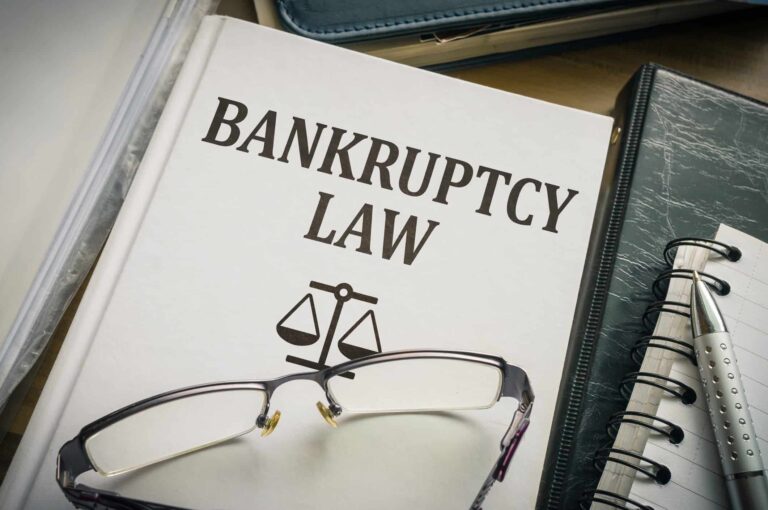How Long Does It Take to Recover After Bankruptcy?
If you are considering filing for bankruptcy, you need to know how your credit score is going to be impacted. You also need to know how long it will take to recover financially. The most important thing to remember is that filing for bankruptcy can provide financial relief when you are struggling the most.

As such, the tradeoff from gaining the protections bankruptcy provides is that your credit score will be affected negatively once your bankruptcy is final. But if you are struggling and your credit score is already being impacted negatively, the ding from your bankruptcy discharge is not going to hurt your score as much as you might think.
Are you considering filing bankruptcy to improve your financial situation? Request a free consultation with a bankruptcy attorney in Las Vegas today.
How does bankruptcy impact a person’s credit score?
By the time you receive the discharge order from the bankruptcy court, they have already notified the major credit bureaus. When you review your credit report from the three major reporting agencies, you will not only see your credit accounts closed with zero balances, but you will also see the bankruptcy as a separate line item on the report.
The impact of debt discharge on your credit score depends on what your score was when you filed for bankruptcy.
- Scores of 700 or Higher – Decreases credit score between 200 and 240 points
- Scores of 600 to 699 – Decreases credit score between 130 and 150 points
- Scores of 300 to 599 – While your score could decrease between 50 and 100 points, it is possible your score could actually increase after your discharge by up to 50 points
Furthermore, the amount of debt discharged and the ratio between the number of negative and positive accounts on your credit report are taken into consideration. After your discharge, all late payments, missed payments, and other negative reporting are reset.
So, if you have some positive accounts, like a car loan or house mortgage, you may see your credit score increase.
How soon will my credit score improve after bankruptcy?
Your credit score may start to improve as soon as 12 months after your bankruptcy is discharged. By making payments on time for any remaining secured debts, your score will improve over time.
However, your bankruptcy will remain on your credit report for quite some time, depending on the type of bankruptcy you filed.
- Chapter 13 bankruptcy – This type of bankruptcy will remain on your credit report for seven years after receiving your discharge.
- Chapter 7 bankruptcy – This type of bankruptcy will stay on your credit report for ten years after receiving your discharge.
How can I improve my credit score and rebuild credit after bankruptcy?
Many people think that bankruptcy leaves a permanent black mark on their credit history. While it does initially impact your credit score, it does not remain on your credit report forever. With time and effort, you can improve your credit score and rebuild your credit.
By taking the right financial steps and not overextending yourself, your credit score will gradually start to improve, even with the bankruptcy on your credit report. In fact, you may be able to get a credit card within a few months after your bankruptcy discharge.
It is also possible to be approved for a car loan and mortgage not too long after your bankruptcy. However, you will pay a higher interest rate because you are considered a higher credit risk than someone with better credit.
By taking these initial steps, using your new credit card wisely, and making your payments on time, it will go a long way toward boosting your credit score and rebuilding your credit.
Do you want to regain control over your finances and credit score? Learn how filing for bankruptcy could be exactly what you need with a free consultation with our bankruptcy attorneys.
How can I recover more quickly after bankruptcy?

While you have no control over how long your bankruptcy will remain on your credit report, you do have control over how fast your credit score will recover. For starters, it is crucial you be aware of scams from credit repair companies that say they can help restore your credit score faster.
Rebuilding your credit score is something they simply cannot do, no matter how much money they want you to pay. The only way to rebuild your score is to work on it yourself and use these tips.
- Pay your bills on time. Try to get into the habit that as soon as you receive a bill, you pay it right away. Do not way until the due date if at all possible.
- Avoid high-interest credit cards with fees. You will get credit card offers that say you are pre-approved. However, if you read the fine print, you will see interest rates as much as 39 percent with annual and monthly fees. While it can be tempting, you are better off passing on these offers.
- Get approved for a secured credit card. A secured credit card is a better option with a lower interest rate and no fees. You deposit money into a savings account which is used as collateral for your credit line. By using the card and making payments on time, your credit score will increase.
- Stick to your budget. Many people get into financial problems when they start overspending. By sticking to your budget, you know exactly what you can and cannot afford.
- Do not go overboard with new credit offers. You only need one credit card post-bankruptcy to avoid getting yourself into financial problems again. Remember, you cannot file for bankruptcy again for quite some time.
- Apply for a credit-builder signature loan. Many banks and credit unions offer credit-builder loans for as little as $500. Once you pay off the $500 by making regular monthly payments, the money is released to you. Plus, your loan is reported to the credit bureaus, so it helps boost your credit.
- Ask someone with good credit to add you to their credit card. Many credit cards allow account holders to add authorized buyers. Being added to someone’s account, who has good credit, can help boost your credit, even if you never use their card. Plus, you are not financially responsible for the monthly payments.
- Monitor your credit report and score. Many banks, credit unions, and credit card companies offer free credit monitoring. Take advantage of this to keep an eye on your report and score and ensure there are no errors.
Is it worth filing for bankruptcy when my credit will be impacted?

You may wonder if it is worth filing for bankruptcy, given that your credit score will be impacted. While it is different in every case, the process was designed to relieve you of your debts and give you a fresh start financially.
With a fresh start, you may have more resources available to make your monthly payments on time, helping you get on top of your finances and improve your payment history. You may also find you have more money left each month than you did before your bankruptcy.
Ultimately, even with a lower credit score, you will be in a better financial position overall. So, it can be worth your time to file bankruptcy when you are struggling financially to make ends meet and pay your debts even with a repayment plan in place.
Where can I find a bankruptcy lawyer near me to get a fresh start?
It is inevitable that bankruptcy will decrease your credit score. However, bankruptcy can be your best option when you want a fresh start. After your bankruptcy is discharged, how you handle and manage your finances will determine how quickly your credit score will recover.
When you are tired of the stress of late notices, harassing collection calls, and want a fresh start, request a free consultation with the Las Vegas bankruptcy attorneys at DeLuca & Associates today.
We will review your financial situation and discuss your options to help you get the fresh start you deserve.
Sources:
Experian. What Is the Lowest Credit Score?
Experian. How to Recover from Bankruptcy.
Loftsgordon. A. Nolo. How Bankruptcy Can Help Your Credit Score.






